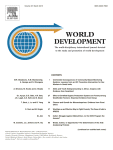The Impact of income and non-income shocks on child labour: Evidence from a panel survey of Tanzania
This paper investigates the impact of income and non-income shocks on child labor using a model in which the household maximizes utility from consumption as well as human capital development of the child. We also investigate if access to credit and household assets act as buffers against transitory shocks. Our results indicate significant effects of agricultural shocks on the child’s overall work hours and agricultural work hours, with higher effects for boys. Crop shocks also have significant adverse effects on school attendance, with girls experiencing a more-than 70% increase in the probability of quitting schooling. The results also indicate that access to a bank account has a buffering effect on the impact of shocks on child hunger. Having a bank account reduces both male child labor and household work hours of a girl child. While assets reduce working hours of girls, we do not find it having a significant effect on boys. We also do not see assets to act as a buffer against shocks
